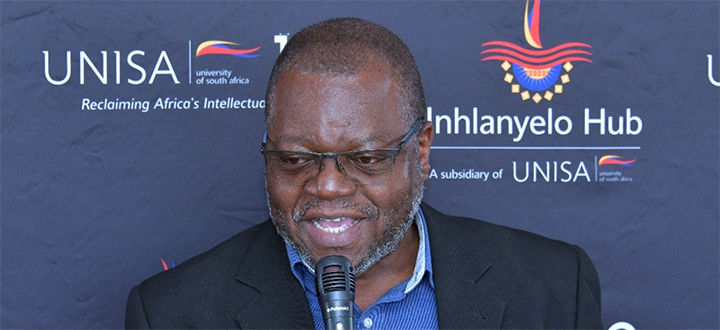News & Events
Transforming scientific research into viable market solutions

Prof Raphael Mpofu, Interim CEO of Inhlanyelo Hub NPC
In a major boost to Unisa’s innovation agenda, Inhlanyelo Hub NPC has been awarded a Fulbright Specialist Project to strengthen deep-tech and deep-science start-ups. The initiative represents more than international recognition – it is a strategic investment in transforming Africa’s largest distance learning institution into a launchpad for impactful, research-driven entrepreneurship.
The project is a bold, forward-looking initiative aimed at building a sustainable, supportive environment to nurture the transformation of scientific research into viable market solutions. Key focus areas include equipping researchers and postgraduates with commercialisation tools, enabling prototyping and IP development, and supporting investment readiness.
Reflecting on this achievement, Professor Raphael Mpofu, Interim CEO of Inhlanyelo Hub NPC, said: “This initiative fills a critical gap. There’s a vast pool of untapped potential in our postgraduate research community. What’s been missing is a structured pathway to take discoveries from the lab bench to the market – and this project begins to bridge that divide.”
Mpofu emphasised the alignment between the Fulbright project and Unisa’s long-term strategy. Regarding its Strategy 2030, the university is committed to transformation, societal impact, and innovation-led development. “Our work directly supports these goals,” he explained. “We’re helping to advance third-stream income through venture creation, encourage inclusive participation, especially by women and youth, and strengthen Unisa’s role in practical, high-impact innovation across Africa.”
Forging global and local partnerships
One of the most exciting aspects of the Fulbright initiative is the chance to forge strong local and global collaborations. Mpofu cited institutions like Georgia Tech, through experts such as Dr Nakia Melecio and David Bridges, as key US partners. At home, anticipated partnerships include the Technology Innovation Agency (TIA), Department of Science and Innovation (DSI), Universities South Africa (USAf), and various private sector players. “These partnerships will connect our innovators with the tools, networks, and mentorship they need to scale,” said Mpofu. “They will also expose our students to global best practices and open doors to new markets.”
What’s next? Key milestones and opportunities for engagement
Looking ahead, the project is set to roll out several high-impact activities:
- A deep-tech start-up bootcamp tailored for Unisa postgraduate students and researchers
- Development of a commercialisation and IP playbook aligned with Unisa’s context
- A pilot venture readiness programme embedded in selected colleges
- Establishment of an international advisory network to guide emerging entrepreneurs
- Co-hosting an annual innovation for impact showcase to attract funders and strategic partners
Importantly, the project is not just for researchers. The broader Unisa community, including academic staff, alumni, and students, can participate by nominating research for commercialisation, mentoring innovators, attending innovation events, or joining ideation sprints.
With the Fulbright Specialist project now under way, Inhlanyelo Hub and Unisa are poised to unlock the next wave of deep-tech innovation—African-led, globally connected, and rooted in real-world solutions.
For more information on Inhlanyelo Hub and its programmes, visit: https://inhlanyelohub.com/en/
* Submitted by Inhlanyelo Hub
Publish date: 2025/06/23
